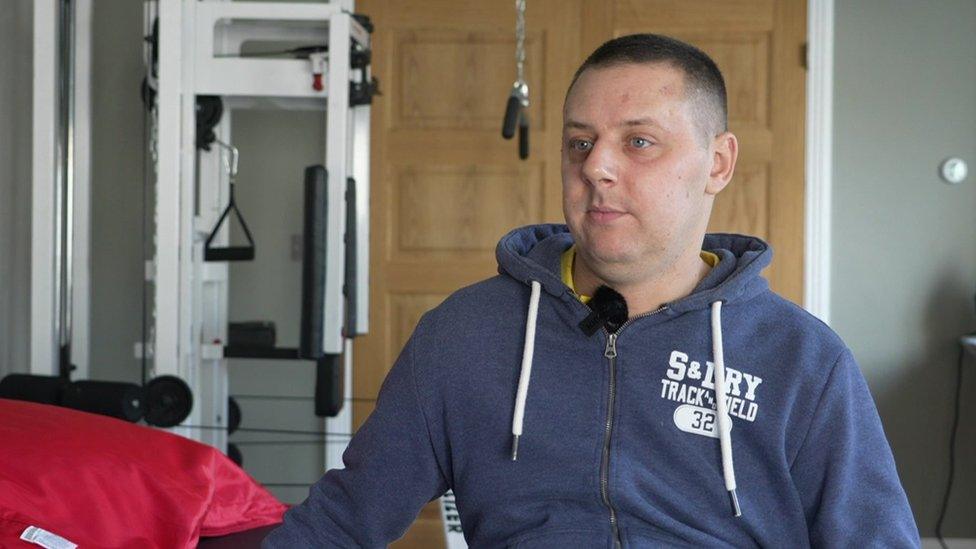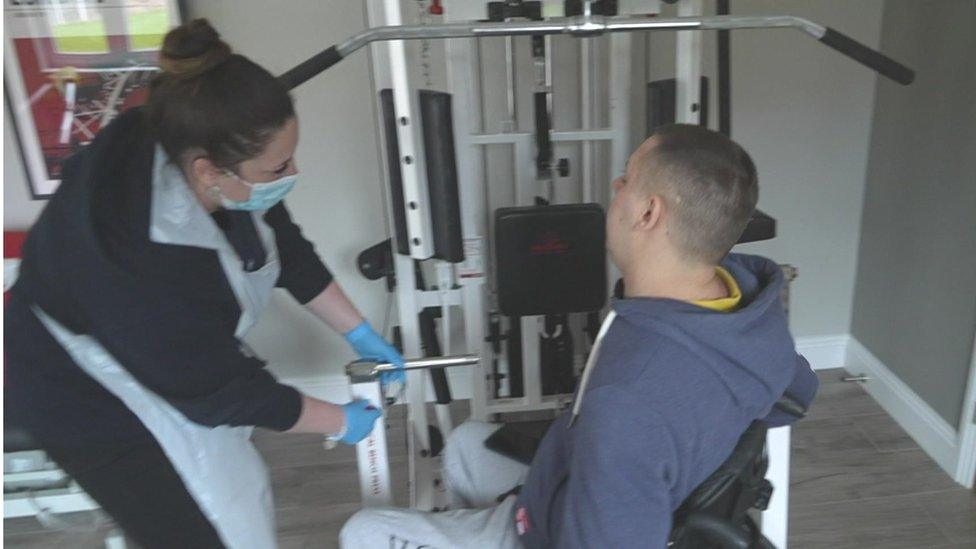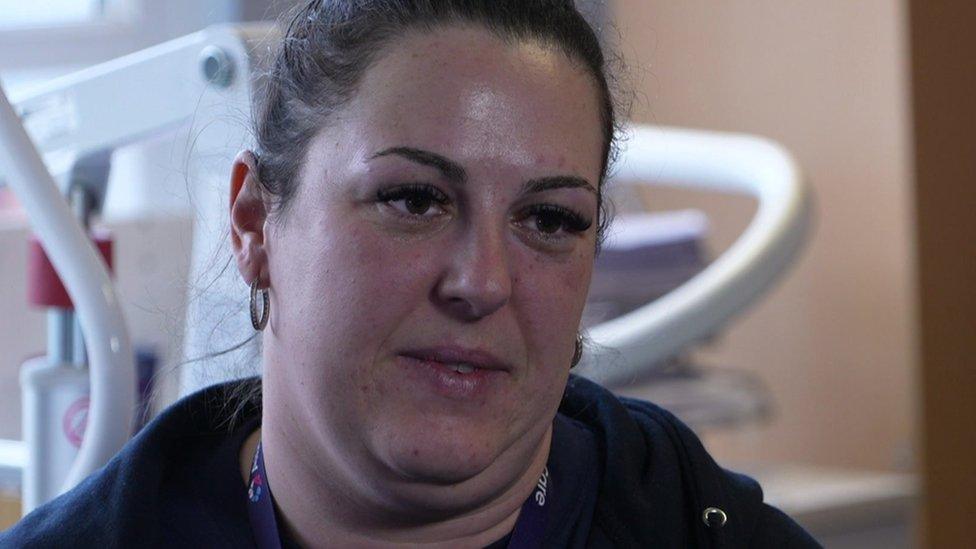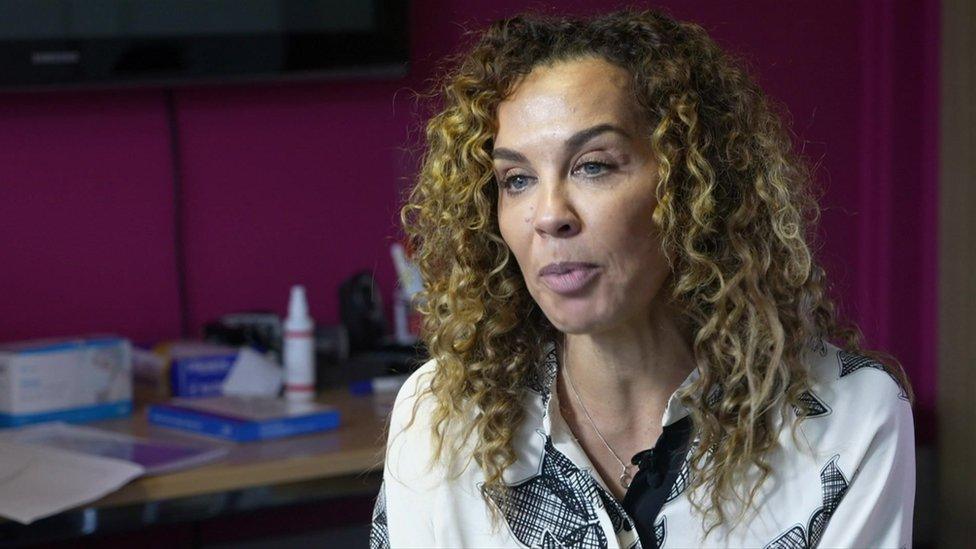Social care: 'I wouldn't be able to cope without my carers'
- Published

After breaking his neck in a car crash, aged 17, Steve uses a wheelchair and has limited use of his hands
As the government publishes detailed plans for social-care funding, BBC News asks carers and clients whether the changes are sufficient.

At his home, in Hemel Hempstead, Herts, Steve, 32, who asked BBC News to withhold his surname, is going through his gym routine.
After breaking his neck in a car crash, aged 17, he uses a wheelchair and has limited use of his hands.
"To keep myself as fit as I can be", Steve needs carer Jazzmine Mace to connect him to the specially adapted exercise equipment.
He pays for live-in support and daily care visits, to help him live as independently as possible.
"I wouldn't be able to cope without them," he says.

Steve needs Jazzmine to connect him to the specially adapted exercise equipment
This is the sort of personalised care the government says its changes will make more widely available.
It is a vision few would argue with - but when it comes to the detail, those providing care and those needing it are more concerned.
The government's newly published policy paper promises more help for disabled people to adapt and repair their homes and:
£300m for supported housing, providing accommodation alongside care support
£150m for new technologies, such as motion-triggered personal-alarm systems
£5m for new ways to tell people how to access support
Having already promised a further £500m, for more training and qualifications for care workers, it says investing in adapted housing, technology and the workforce will enable more people to access high-quality care when they need it.
Steve welcomes the announcement of extra funding but says it is crucial the government invests sufficiently in social care.
"Unless a miracle does happen, with me, I'm going to need it for the rest of my life - and I'm still only young," he says.
"There's a lot of young people out there that need care, as well as old people."
'Absolutely lovely'
Jazzmine says the beauty of her job is the chance "to make a difference to people's lives".
Even something as simple as giving someone a wash "is absolutely lovely", she says.

Jazzmine combines front-line social care with a management role
But although she loves her job, Jazzmine says home-care workers face extreme pressure, for example when administering medication or coping with challenging behaviour.
"You know, there's been several times when we've had a cup of tea thrown at us," she says.
"I don't think people realise the pressure that social care in the community faces."
Her employer, Abbots Care, has 500 staff, supporting 1,000 people in their own homes, and Jazzmine has been able to complete social-care training courses up to degree level.
She finds study challenging but is "absolutely loving it" and combining front-line work in the community with an office-based management role.
'Low pay'
Jazzmine's mentor at work, senior manager Karen Bateman, says social care "is such a complex role... to have the ability, to have many skills" - but too often, the same workers could earn more money with less pressure "stacking shelves at Tesco's".
Improving pay is key to recruiting and keeping staff but better career development, progression and training would help retain staff across the sector.
"It is a skilled role - and that's what we want recognition for," Karen adds.
Abbots Care managing director and co-founder Camille Leavold says low pay and poor prospects for care workers mean, like the rest of the sector, she struggles to recruit and retain staff.
"We just do not have enough people to meet the needs of the people waiting for homecare... nationwide, not just locally," she says.

Camille Leavold wants to see social care professionalised
In recent weeks, up to 100 people have been "waiting at the local hospital for homecare", Camille says.
Until care is in place, their discharge can be delayed, with a knock-on effect on the availability of hospital beds.
And without better funding to allow employers to boost salaries, the crisis will only deepen, Camille says.
She also wants social care professionalised, with all care workers on a professional register, "in the same way nursing was professionalised".
Mental-health support
A lot of hope was riding on Wednesday's announcement of adult social-care plans.
In a care system in crisis for a long time, people wanted a clear vision.
And Care Minister Gillian Keegan said she was setting out an ambitious 10-year plan on an issue other governments had ducked for too long.
The government has promised more access to mental-health support for staff.
And its aim to provide outstanding personalised care, which is fair and accessible, will be welcomed.
But for many in the care sector, the actual details of what is proposed are disappointing, with no new measures to fix the acute problems they face now.